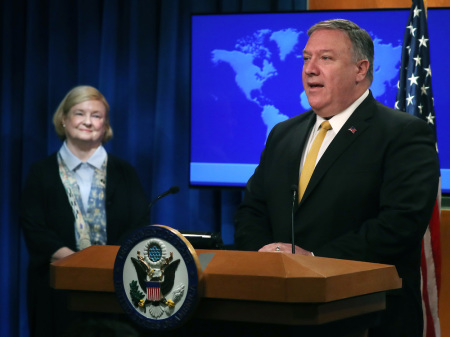State Dept. launches new Commission on Unalienable Rights; liberals voice opposition

Secretary of State Mike Pompeo announced this week the formation of a controversial State Department Commission on Unalienable Rights, which will help him define human rights as the definition has “drifted” through the years to accommodate abortion and LGBT rights.
During a press conference Monday, Pompeo argued that the commission’s creation comes at a time in which there is much confusion among nation-states and international institutions about “their respective responsibilities concerning human rights.”
He said the new advisory committee, chaired by conservative Harvard Law School professor Mary Ann Glendon, will provide him with recommendations “grounded in our nation’s founding principles and the principles of the 1948 Universal Declaration of Human Rights.”
“It’s a sad commentary on our times that more than 70 years after the Universal Declaration of Human Rights, gross violations continue throughout the world, sometimes even in the name of human rights,” Pompeo said.
“International institutions designed and built to protect human rights have drifted from their original mission. As human rights claims have proliferated, some claims have come into tension with one another, provoking questions and clashes about which rights are entitled to gain respect.”
The State Department announced its intent to form the advisory committee in the Federal Register in May.
The Federal Register post explained that the committee’s goal is to provide the secretary of state with “fresh thinking about human rights discourse where such discourse has departed from our nation's founding principles of natural law and natural rights.”
“I hope that the commission will revisit the most basic of questions: What does it mean to say or claim that something is, in fact, a human right? How do we know or how do we determine whether that claim that this or that is a human right, is it true, and therefore, ought it to be honored?” Pompeo said.
“How can there be human rights, rights we possess not as privileges we are granted or even earn, but simply by virtue of our humanity belong to us? Is it, in fact, true, as our Declaration of Independence asserts, that as human beings, we — all of us, every member of our human family — are endowed by our creator with certain unalienable rights?”
Along with Glendon, the commission will have nine other members, including Islamic scholar Hamza Yusuf and former chair of the bipartisan U.S. Commission on International Religious Freedom Katrina Lantos Swett.
The formation of the commission was praised by USCIRF Vice Chair Gayle Manchin, the husband of Democrat West Virginia Sen. Joe Manchin. She said in a statement that the new commission will “lead to higher impact negotiations on behalf of the more than 70 percent of the world’s population that is currently suffering persecution or abuse.”
The new commission, however, does not come without criticism from those who fear it is an attempt to pull abortion and LGBT rights out from the international human rights umbrella.
Amnesty International, a pro-abortion international human rights watchdog, railed against the commission’s formation.
“The Trump Administration is trying to redefine human rights in what appears to be a shameful attempt to further hateful policies,” the organization tweeted. “Women's rights are human rights. LGBTQ rights are human rights. No ‘Commission on Unalienable Rights’ will change that.”
Jamil Dakwar, director of the American Civil Liberties Human Rights Program, called the commission an “affront to universal human rights.”
“It will no doubt be welcomed by social conservatives who for decades fought against LGBTQ rights, women’s rights, affirmative action and economic justice,” he wrote in a tweet.
Democrat New York Rep. Elliott Engel, chairman of the House Foreign Affairs Committee, voiced his concern with the commission.
“This commission risks undermining many international human-rights norms that the United States helped establish, including LGBTQI rights and other critical human-rights protections around the world,” Engel said in a statement.
“Decades ago, Congress created an entire bureau in the State Department dedicated to defending and reporting on human rights and advising the Secretary and senior diplomats on human rights and democratic development. Now the Secretary wants to make an end run around established structures, expertise, and the law to give preference to discriminatory ideologies that would narrow protections for women, including on reproductive rights; for members of the LGBTQI community; and for other minority groups.”
Engel also explained that Pompeo and his staff provided little information on the commission despite repeated requests. Engel said the agency responded “vaguely only at the 11th hour.”
“That’s why I cosponsored a measure that recently passed the House to prohibit funding for this bizarre effort,” Engel stated.
Meanwhile, USCIRF Chairman Tony Perkins, a well-known Christian conservative activist and head of the Washington, D.C.-based advocacy group Family Research Council, called the commission’s formation a “meaningful step in advancing human rights around the world.”
In his statement shared through FRC, Perkins argued that the international consensus on human rights has been “eroded” for decades as “human rights abusers like China, Iran and Cuba have wormed their way onto 'human rights commissions' in their search for international legitimacy.”
“The world's worst actors have used international platforms to shape policy on an issue of dignity that they neither value nor practice,” Perkins contended. “Other special interest groups have sought to expand the definition of a 'human right' to include virtually anything. If everything is a human right then the term begins to have little meaning.”
Perkins stressed that the commission will help “further the protection of religious freedom,” which he said is the “foundation for all other human rights.”





















